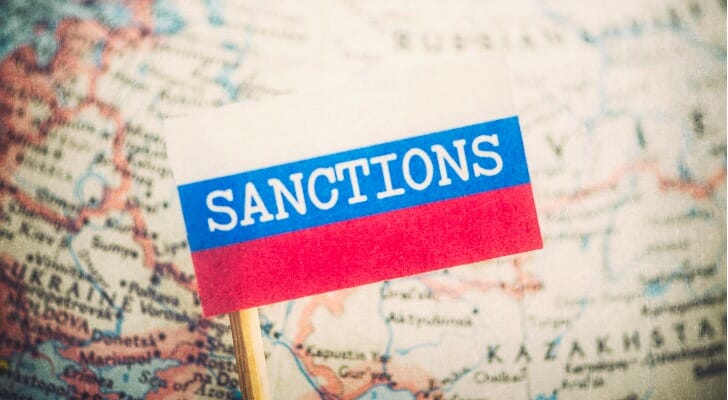 As the Russia-Ukraine conflict continues to rage and cease-fire talks have come to a temporary impasse, a new senate bill says “nyet” to Russian stocks in your 401(k).
As the Russia-Ukraine conflict continues to rage and cease-fire talks have come to a temporary impasse, a new senate bill says “nyet” to Russian stocks in your 401(k).
This is part of a concerted effort of Western economic sanctions against Russia to punish the country and hamstring its war effort.
The Russian government and major firms have already been cut off from the global banking system, and dozens of international companies have already pulled out of the country. Today, President Joe Biden announced a ban on all imports of Russian oil and gas. And added to the mix is this latest economic blow that’s relevant to Americans on a personal finance level: newly-proposed legislation aims to protect American retirement funds from Russian securities.
Need advice during times of financial volatility? Consider working with a qualified financial advisor who can help manage your portfolio and create a comprehensive financial plan for you and your family.
New Anti-Russia Legislation
On March 2, Senators Marco Rubio and Rick Scott (R-Fl.) introduced new legislation aimed at protecting American retirement portfolios from the Russia-Ukraine fallout. Called the “IMPAIR Russia” Act, short for Instituting Measures to Protect American Investors and Retirees from Russia Act, the bill would prohibit investment companies, insurance companies and fiduciaries from buying Russian stocks and bonds as soon as it is enacted by Congress.
“We need to minimize the resultant harm to Americans [from Putin’s invasion of Ukraine],” Senator Rubio said in a statement announcing the bill. “Many Americans do not even realize that fund managers have placed their money in these Russian companies.”
By prohibiting investment funds from purchasing Russian securities, the idea is that American retirement savers would not be excessively exposed to Russian market volatility and Russian companies would not be handed necessary capital as Western sanctions further grip the country’s economy.
On Mar 4, the London Stock Exchange suspended trading in Russian securities, joining others like BP, Boeing and Norway’s Sovereign Wealth Fund in limiting exposure to Russian assets. This, while drying up capital available to the Russian economy, has also caused a freeze on market liquidity. Investors have been left wondering how to exit their positions.
What Retirement Savers Can Do
 Although the IMPAIR Russia Act would only affect securities purchased on or after the date of enactment, it may be helpful for retirement savers to check if they are already exposed to Russian securities.
Although the IMPAIR Russia Act would only affect securities purchased on or after the date of enactment, it may be helpful for retirement savers to check if they are already exposed to Russian securities.
Many popular funds invest in Russia as part of a broader investment strategy. It’s possible you may be holding Russian stocks in your retirement account without realizing it. Kentucky’s teacher retirement system was heavily exposed to Russia’s Sberbank, dealing the pension fund a blow in the economic fallout from this war.
Of course, with the sharp decline of the ruble, some investors might take advantage of the plunge to buy up more Russian stocks in a gamble for long-term value. Given the volatile climate, others might wish to divest themselves of any Russian involvement.
Notably, most of the funds that allocate to Russian securities are emerging market funds, which invest in stocks and bonds in developing countries like China and Brazil. Financial experts say that emerging market funds can be riskier investments, since developing countries often have unstable and volatile governments, but with that risk comes the potential for higher returns. Whether or not you hold shares in an emerging market fund depends a lot on your risk tolerance profile.
Investment firm Vanguard recently published a list of its funds with direct exposure to Russian securities. Fidelity announced last week that it would no longer be buying Russian or Belurusian securities. Similarly, JPMorgan Asset Management suspended its JPM Emerging Europe Equity fund, and asset manager Blackrock is currently discussing with the Securities and Exchange Commission (SEC) how it might reasonably exit its Russian positions.
Bottom Line
 Florida senators recently proposed legislation to ban new purchases of Russian-issued securities. Although many managed funds are already limiting sales and exposure to Russian stocks and bonds, it may be useful for you to check your portfolio and make sure your exposure aligns with your risk tolerance and ethical investing objectives.
Florida senators recently proposed legislation to ban new purchases of Russian-issued securities. Although many managed funds are already limiting sales and exposure to Russian stocks and bonds, it may be useful for you to check your portfolio and make sure your exposure aligns with your risk tolerance and ethical investing objectives.
Tips for Investing During Volatile Times
- Investing can be emotional, especially during volatile and difficult times. A professional can help manage your portfolio and create a solid, long-term financial plan, taking the emotion out of investing. So consider speaking with a qualified financial advisor. SmartAsset’s free tool matches you with up to three financial advisors who serve your area, and you can interview your advisor matches at no cost to decide which one is right for you. If you’re ready to find an advisor who can help you achieve your financial goals, get started now.
- Use SmartAsset’s free asset allocation calculator to get an estimate of the right mix of stocks, bonds and cash for your risk tolerance and investment goals.
Photo credit: ©iStock.com/CatLane, ©iStock.com/Tzido, ©iStock.com/utah778